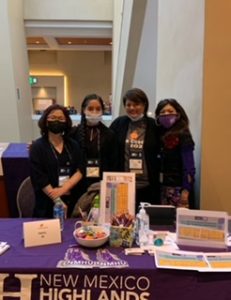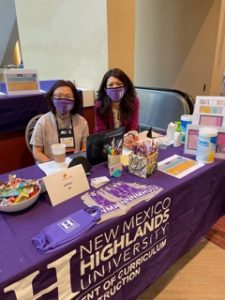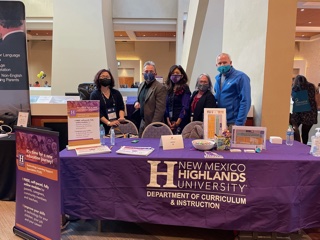
New Mexico Highlands University table at the 2021 La Cosecha conference
December 7, 2021
This year, Highlands University partnered with La Cosecha Conference to promote bilingual education and increase the number of bilingual teachers across New Mexico, the U.S., and internationally.
According to its website, La Cosecha is a conference “by teachers for teachers,” which is held annually in Albuquerque. This year’s agenda included keynote speaker Dolores Huerta, civil rights activist and co-founder of the National Farmworkers Association. Sessions offered a broad range of panels on topics such as literacy, math instruction, and preparing teaching materials in more than one language.
According to Adrian Sandoval, coordinator of the Student Leadership Institute for La Cosecha and director of the Center for the Education and Study of Diverse Populations at Highlands University, dual language learning has been a part of New Mexico’s educational approach for 28 years. Since its inception in 1996, Sandoval said the conference has grown to include 38 states and at least 15 countries outside the U.S.
“It’s really done an amazing thing, not only for New Mexico but also education nationally,” said Sandoval. “La Cosecha has been very much involved in creating standards for language education and they provide professional learning throughout the nation.”
Sandoval said Highlands University’s long-standing leadership in bilingual education prompted conference organizers to reach out to the school to collaborate on offering college credit to conference attendees.
“NMHU has had the fame and fortune of being well known for producing quality bilingual educators throughout our state in previous years,” said Sandoval. “Back in the 70s, the 80s, and even early 90s, NMHU was very recognized, and so I think La Cosecha recognized that there’s a gem in their backyard.”
As the result of the 2018 Yazzie/Martinez v. State of New Mexico lawsuit, Sandoval said state deficiencies in public education offerings for English learners, special needs students, and students experiencing economic hardship were recognized. As a result, Yazzie/Martinez determined a need for the public education department to fund high quality programming to address the needs of all students. He said he sees Highlands University’s partnership with La Cosecha as one way to address the Yazzie/Martinez findings and help ensure there are more dual language educators trained in New Mexico.
“We don’t have enough bilingual teachers,” said Sandoval. “Through this relationship, we’re saying NMHU is a place to get your certification in bilingual education. NMHU is a place to become an educator who is going to be culturally and linguistically responsive within the state of New Mexico, and elsewhere.”
Prior to the pandemic, Sandoval said roughly 3,000 people attended La Cosecha in 2019, many of whom were already teachers working towards their master’s degrees or dual language certification. He said as more teachers begin to receive culturally and linguistically responsive teaching degrees, it will begin to address the gaps identified by the Yazzie/Martinez ruling.
Seonsook Park, Highlands education professor and department chair of Curriculum and Instruction, said the credit hours offered through Highlands are available to undergraduate and graduate students from any institution that accepts transferred credit. Park, who is bilingual in Korean and English, said learning more than one language is an asset and makes education more accessible.
“Bilingual education is an opportunity for everybody–not only bilingual students, but also the community,” said Park. “We need bilingual leaders serving our students appropriately. As human beings, the foundation to a basic education is a human right. Language is a part of your life and without it, things cannot really work.”
For Sandoval, his commitment to strengthening bilingual education in New Mexico comes from a personal place as well as his work as an educator.
“My relatives were chastised for speaking Spanish, and our indigenous communities were chastised in the same way—sometimes physically abused,” said Sandoval. “Part of this idea of bilingual education also is a response to that generational trauma that has negatively impacted our populations.”
Sandoval said bilingual, multicultural education is a way to proactively respond to language and culture loss by valuing and supporting emerging bilingual communities that typically are marginalized for a lack of fluency in English.

Seonsook Park and Elisabeth Valenzuela
Sandoval said language and culture loss in New Mexico is significant, and strengthening dual language learning through La Cosecha and the education department at Highlands University will help New Mexicans reconnect with their heritage.
“The bilingual individual, the bicultural individual—you really have more than one way to analyze and express yourself,” said Sandoval. “Bilingual education has multiple connections in supporting me to grow professionally, personally, and to reconnect to who I’ve been and what my heritage has been—and recognizing that my heritage isn’t just Spanish speaking, it is indigenous speaking as well.”
Elisabeth Valenzuela, a bilingual education professor at Highlands University, said the school’s impact on the community was evident at the conference this year due to the large number alumni educators who stopped by the Highlands booth. Valenzuela said the conference also served as an excellent opportunity for recruitment and she was impressed by the number of engaged high school students in attendance.
Valenzuela, Park, and Sandoval all have previous personal connections to the Dolores Gonzales Elementary School where La Cosecha began, and Valenzuela said Dolores Gonzales’s work on developing bilingual curriculum and materials is a legacy she builds on in her own classroom. According to Valenzuela, the curriculum Dolores Gonzales built, and the intent of La Cosecha, is to provide programs that are culturally and linguistically responsive to the community.
“In a class I teach, Literatura infantil y juvenil, I shared some of those materials with them,” said Valenzuela. “For a lot of students, it’s the first time that they discover that these materials even exist, and they could see themselves reflected—especially our students that are Nuevo Mexicano.”
Park said they are already brainstorming projects they can be a part of next year at La Cosecha, and they’re working on some long-term community service ideas as well.
“There is quite a bit of depth and breadth to our efforts within the School of Education,” said Sandoval. “We see its potential impact on the community and the surrounding communities as well, with this eye towards revitalization, healing the trauma, and really trying to support people in a different way.”

